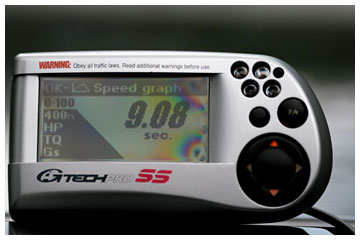Volkswagen Golf 1.4 TSI DSG-7 Review
13 Aug 2008|55,527 views
 |
Tech wise
But of course, they haven't really stopped down on things, because 121bhp is quite remarkable from a 1.4-litre petrol turbo that pushes 14-17 kilometres to the litre. Designed to replace the 1.6-litre FSI, there's a 30-per cent torque increase over the FSI - 200Nm available anywhere between 1,500 and 3,500rpm. Consider that it weighs nearly 1300kg after all that silicone, sound dampening and whatnot™
Volkswagen's engineers have been squeezing DSGs into as many cars as possible. By end 2007, 75 different models had one shoehorned into them. Then, they ran into a wall - the 6-speeder wouldn't fit into anything smaller than the Golf.
What did they do?
Design a smaller, more efficient DSG that miraculously, had more ratios instead of fewer. Transversely mounted, it barely weighs 70 kilos - 23kg lighter than the current 6-speeder. It works by allowing for a lower first gear for better acceleration, less drag and to avoid clutch slipping in crawling traffic, while seventh gear is intended for very economical motorway driving.
The "dry" unit is an interesting piece of kit. About half the amount of engine oil is needed to keep it lubricated and running as compared to the "wet" 6-speeder. So without an oil bath to cool those spinning clutches, less energy is lost to the whipping of said fluid. Another reason, according to VW, would be the platform for future stop-start technology, and long-awaited hybrid drivelines, made possible by an electric oil pump and supplementary systems.
With interests in reliability
Here's something that we found to be of interest - as part of Volkswagen's long-term reliability plan, they've been stripping customer car DSGs with mileage figures of up to 320,000 kilometres, only to find that all of them were well within projected wear rates.
Blame their funky way of doing things. In addition to a standard, anti-suicide ECU nomenclature, a pre-programmed failsafe function will swing into effect in order to prevent permanent damage.
 |
By this, we mean a warning light, after which the cabin will be flooded with the smell of burning clutch. If said driver were ignorant enough, the ECU will imitate a slipping clutch. By then, any well-informed driver would panic. And for anyone devoid of common sense, the driveline will be completely disengaged until normal temperatures resume.
To improve durability even further, the DSG-7 will not be fitted with anything that churns more than 250Nm of torque in order to prevent the clutch from frying itself.
Performance
There's much to say about the way it drives. While no "launch" programme seems to be present, the DSG will still swap ratios faster than any manual. It'll still rev-match on downshifts with an enthusiastic blip of the throttle, and no - with 7 ratios, it doesn't make a mess of itself.
So well sorted is the car, we decided to forgo self-help mode and leave it to its own devices. If you're not in for a fast, spirited drive, leave it in "D." The gearbox automatically shifts up into the highest possible ratio as soon as it can in order to save fuel. If you're going to break the wall of speed limits, slot it into "S," and prod the throttle a little bit more. You'll find it easier to get the car into a lower gear and into the power band so you can make quick with the right lane.
 For those who have never driven a DSG in their life, be assured that it's entirely capable of functioning like a full blown automatic, including that "creep" so you can easily park your Golf. The clutch engages gently from rest, so you do not get caught off-guard with any forward or backward surging.
For those who have never driven a DSG in their life, be assured that it's entirely capable of functioning like a full blown automatic, including that "creep" so you can easily park your Golf. The clutch engages gently from rest, so you do not get caught off-guard with any forward or backward surging. Delivery of this car's grunt can best be described as "elegant." "Scurried" is reserved for a Golf GT while "frantic" best suits the GTI. You won't find this Golf scrambling for grip every time you floor it at the lights, but it still manages to spin its front wheels if you try moderately hard.
Fuel economy wasn't really measured, but we can vouch for its frugality in real world situations. 90km/h on a flat stretch of highway in 7th produced a meager 21km/l reading on the trip meter over an average of five minutes. At this speed, the tachometer reads just under 2000rpm. That figure drops to about 15km/l when we increased our speed to 110km/h.
Price and equipment
The gunmetal grey on the centre console looks similar to that of the Touran Sport. The soft moulded plastics, rear air-conditioning, tactile switches, nicely stitched leathers, fabric-covered A-pillars and blue instrument backlighting with red needles are expectedly synonymous with the rest of the Golf range.
 |
15-inch alloy wheels with 195/65 tyres, an iPod input jack, cruise control, automatic lights with a leather-trimmed multifunction wheel, anti-lock brakes, stability control and six airbags are all there - for $84,300, or the price of the outgoing Golf 1.6 FSI.
Amongst others?
There are precious few others that match up to the Golf 1.4 TSI when it comes to pragmatism on a daily basis. For one, the Peugeot 308 Turbo. While it betters the Golf by a tenth of a second in real world tests and wins in the looks department, the engine and transmission are a severe letdown, so are those fuel figures. It costs around $89,000, while the cheaper 308 1.6A would be too far off in comparison.
In a separate class altogether, the similarly priced, if not more expensive hybrids might just be another consideration. However they pale in comparison by sheer complexity with their on-board plethora of electronics and complicated tax structures, not to mention a performance deficit.
Ironically, the Golf TSI's main rival can be found in Volkswagen's own stable - the Polo Blue Motion. It features a 1.4-litre turbodiesel three cylinder engine, and the entire vehicle has been tuned for maximum mechanical and aerodynamic efficiency.
While the Golf maximizes all-rounded practicality, the manual Polo sacrifices some of that for far better mileage figures, and for nearly the same price.
While diesel taxes need to be contemplated with, one can't deny the savings it brings, especially for the driver who does more than 150 kilometres a day.
However, if you're not so "hard-core" with a family of four, and want a hip, refreshing alternative to the multitude of Japanese/Korean clones on our roads, then you might want to consider playing this game of Golf.
The new 1.4 TSI DSG-7 already returns a proven 22-per cent better fuel mileage as compared to the older Golf 1.6 FSI with the conventional torque converter automatic, not to mention better performance and emissions (139g/km CO2) figures.
Owning one of these just got cheaper. For real.
 |
Tech wise
But of course, they haven't really stopped down on things, because 121bhp is quite remarkable from a 1.4-litre petrol turbo that pushes 14-17 kilometres to the litre. Designed to replace the 1.6-litre FSI, there's a 30-per cent torque increase over the FSI - 200Nm available anywhere between 1,500 and 3,500rpm. Consider that it weighs nearly 1300kg after all that silicone, sound dampening and whatnot™
Volkswagen's engineers have been squeezing DSGs into as many cars as possible. By end 2007, 75 different models had one shoehorned into them. Then, they ran into a wall - the 6-speeder wouldn't fit into anything smaller than the Golf.
What did they do?
Design a smaller, more efficient DSG that miraculously, had more ratios instead of fewer. Transversely mounted, it barely weighs 70 kilos - 23kg lighter than the current 6-speeder. It works by allowing for a lower first gear for better acceleration, less drag and to avoid clutch slipping in crawling traffic, while seventh gear is intended for very economical motorway driving.
The "dry" unit is an interesting piece of kit. About half the amount of engine oil is needed to keep it lubricated and running as compared to the "wet" 6-speeder. So without an oil bath to cool those spinning clutches, less energy is lost to the whipping of said fluid. Another reason, according to VW, would be the platform for future stop-start technology, and long-awaited hybrid drivelines, made possible by an electric oil pump and supplementary systems.
With interests in reliability
Here's something that we found to be of interest - as part of Volkswagen's long-term reliability plan, they've been stripping customer car DSGs with mileage figures of up to 320,000 kilometres, only to find that all of them were well within projected wear rates.
Blame their funky way of doing things. In addition to a standard, anti-suicide ECU nomenclature, a pre-programmed failsafe function will swing into effect in order to prevent permanent damage.
 |
By this, we mean a warning light, after which the cabin will be flooded with the smell of burning clutch. If said driver were ignorant enough, the ECU will imitate a slipping clutch. By then, any well-informed driver would panic. And for anyone devoid of common sense, the driveline will be completely disengaged until normal temperatures resume.
To improve durability even further, the DSG-7 will not be fitted with anything that churns more than 250Nm of torque in order to prevent the clutch from frying itself.
Performance
There's much to say about the way it drives. While no "launch" programme seems to be present, the DSG will still swap ratios faster than any manual. It'll still rev-match on downshifts with an enthusiastic blip of the throttle, and no - with 7 ratios, it doesn't make a mess of itself.
So well sorted is the car, we decided to forgo self-help mode and leave it to its own devices. If you're not in for a fast, spirited drive, leave it in "D." The gearbox automatically shifts up into the highest possible ratio as soon as it can in order to save fuel. If you're going to break the wall of speed limits, slot it into "S," and prod the throttle a little bit more. You'll find it easier to get the car into a lower gear and into the power band so you can make quick with the right lane.
 For those who have never driven a DSG in their life, be assured that it's entirely capable of functioning like a full blown automatic, including that "creep" so you can easily park your Golf. The clutch engages gently from rest, so you do not get caught off-guard with any forward or backward surging.
For those who have never driven a DSG in their life, be assured that it's entirely capable of functioning like a full blown automatic, including that "creep" so you can easily park your Golf. The clutch engages gently from rest, so you do not get caught off-guard with any forward or backward surging. Delivery of this car's grunt can best be described as "elegant." "Scurried" is reserved for a Golf GT while "frantic" best suits the GTI. You won't find this Golf scrambling for grip every time you floor it at the lights, but it still manages to spin its front wheels if you try moderately hard.
Fuel economy wasn't really measured, but we can vouch for its frugality in real world situations. 90km/h on a flat stretch of highway in 7th produced a meager 21km/l reading on the trip meter over an average of five minutes. At this speed, the tachometer reads just under 2000rpm. That figure drops to about 15km/l when we increased our speed to 110km/h.
Price and equipment
The gunmetal grey on the centre console looks similar to that of the Touran Sport. The soft moulded plastics, rear air-conditioning, tactile switches, nicely stitched leathers, fabric-covered A-pillars and blue instrument backlighting with red needles are expectedly synonymous with the rest of the Golf range.
 |
15-inch alloy wheels with 195/65 tyres, an iPod input jack, cruise control, automatic lights with a leather-trimmed multifunction wheel, anti-lock brakes, stability control and six airbags are all there - for $84,300, or the price of the outgoing Golf 1.6 FSI.
Amongst others?
There are precious few others that match up to the Golf 1.4 TSI when it comes to pragmatism on a daily basis. For one, the Peugeot 308 Turbo. While it betters the Golf by a tenth of a second in real world tests and wins in the looks department, the engine and transmission are a severe letdown, so are those fuel figures. It costs around $89,000, while the cheaper 308 1.6A would be too far off in comparison.
In a separate class altogether, the similarly priced, if not more expensive hybrids might just be another consideration. However they pale in comparison by sheer complexity with their on-board plethora of electronics and complicated tax structures, not to mention a performance deficit.
Ironically, the Golf TSI's main rival can be found in Volkswagen's own stable - the Polo Blue Motion. It features a 1.4-litre turbodiesel three cylinder engine, and the entire vehicle has been tuned for maximum mechanical and aerodynamic efficiency.
While the Golf maximizes all-rounded practicality, the manual Polo sacrifices some of that for far better mileage figures, and for nearly the same price.
While diesel taxes need to be contemplated with, one can't deny the savings it brings, especially for the driver who does more than 150 kilometres a day.
However, if you're not so "hard-core" with a family of four, and want a hip, refreshing alternative to the multitude of Japanese/Korean clones on our roads, then you might want to consider playing this game of Golf.
The new 1.4 TSI DSG-7 already returns a proven 22-per cent better fuel mileage as compared to the older Golf 1.6 FSI with the conventional torque converter automatic, not to mention better performance and emissions (139g/km CO2) figures.
Owning one of these just got cheaper. For real.
Car Information
Volkswagen Golf 1.4 TSI DSG (A)
CAT A|Petrol|18.5km/L
Horsepower
91kW (122 bhp)
Torque
200 Nm
Acceleration
9.4sec (0-100km /hr)
This model is no longer being sold by local distributor
All Used Volkswagen GolfThank You For Your Subscription.



























